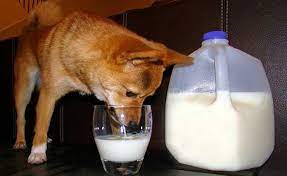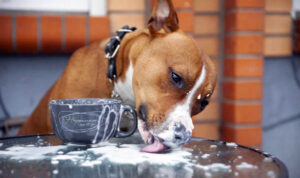Can dogs have condensed milk? Well – this guide created by our team will provide you with everything you need to know about dogs interacting with condensed milk.
Condensed milk is something we are all familiar with. Some people love it, and some can’t stand it. As for dogs, they often like to taste and consume random things around your house, so you have to keep them safe. However, what happens if your dog accidentally consumes condensed milk, or what if you’re planning to give it to your dog?
Before scrolling down to a more in-depth answer of this guide, you can check out these other similar topics from our team at We Love Doodles: Can Dogs Have Almond Milk to Drink and Can Dogs Eat Pepper Jack Cheese?
Table of Contents
ToggleWhat is Condensed Milk?
Condensed milk is cow’s milk that has had water removed and, usually, has had sugar added. It is often sold in cans as it’s a popular baking ingredient. Pumpkin pies, puddings, and other dishes get their creamy, milky flavor from condensed milk. Some people even like it on its own!
But what about condensed milk for dogs? Can your furry friend partake in the creamy goodness? Let’s learn more.
Related: Can Dogs Drink Distilled Water?
Can Dogs Have Condensed Milk?
The short answer is – yes, condensed milk for dogs is fine in moderation. However, while it is not toxic or unsafe, it is not very good for them, and there is not much benefit to giving your dog condensed milk. It’s okay to give your dog an occasional treat, but if you give it to them regularly, it can make them sick.
Can Puppies Have Condensed Milk?
We don’t recommend giving puppies condensed milk. Young puppies should drink their mother’s milk or milk replacement, but if both are unavailable, regular cows’ or oat milk will suffice.
Why is Condensed Milk Bad For Dogs?
Condensed milk contains a lot of sugar, which can cause several problems. Let’s take a look at what they are.
- Upset Stomach: In the short term, your dog may experience gastrointestinal issues such as a tummy ache, vomiting, and diarrhea from drinking condensed milk, especially if they have a sensitive stomach. That said, so long as it clears up within a day or two and there are no other symptoms, it’s not too serious, and it shouldn’t be anything to worry about – but we wouldn’t recommend giving it to your dog again!
- Lactose Intolerance: Like humans, dogs can suffer from allergies, including lactose intolerance. It’s a pretty common allergy in dogs. Symptoms include stomach cramps, diarrhea, vomiting, lack of appetite, bloating, flatulence, weakness, weight loss, and uncontrollable bowel movements. They may also behave strangely or appear clingy when experiencing these symptoms, which usually occur between 30 minutes – 2 hours after consuming food containing lactose. If you think your dog has lactose intolerance, you should talk to your vet about getting it confirmed and cutting it out of their diet.
- Weight Gain: Eating lots of sugar can also cause dogs to gain weight, which increases the risk of other health conditions like heart disease, lessens their exercise tolerance, reduces their quality of life, and also makes symptoms of arthritis worse in seniors dogs.
- Diabetes: When consumed in high quantities regularly, excess sugar can contribute to diabetes in dogs. This can lead to increased appetite, thirst, and urination, unexplained weight loss, sweet-smelling breath, and lethargy. It can also increase the likelihood of contracting UTIs and even lead to eyesight loss or worse if left untreated. So it is important to get your dog’s blood tested at the vet as soon as possible if you suspect them of having diabetes. Although it’s not treatable, it is manageable with regular insulin shots, dietary changes, monitoring, and vet check-ups.
Does Condensed Milk Have Any Benefits For Dogs?
Like regular milk, condensed milk for dogs is a good source of calcium, riboflavin, phosphorus, and protein, as well as vitamin D, vitamin B12, and vitamin A. However, other, better foods can provide your dog with all these nutrients without the excessive sugar content of condensed milk.
How Often Can I Give My Dog Condensed Milk?
If your dog likes condensed milk and you want to give it to them, it should be given to them as an occasional treat and in very small quantities – in conjunction with a healthy daily diet! If you give your dog condensed milk, it should be no more than a few tablespoons (depending on their size), and you should give it to them no more than once a week.
Dog Product Recommendations: Best No Spill Dog Water Bowls.
Is Condensed Milk the Same as Evaporated Milk?
Many dog owners confuse condensed milk with evaporated milk, but they are different. Both have removed the water, but evaporated milk has no added sugar, making it a much better treat for dogs than condensed milk. It can be a good replacement for young puppies when you run out of regular milk. That said, sometimes, evaporated milk is called unsweetened condensed milk when it is sold in stores.
Can Dogs Have Regular Milk to Drink?
Milk is a safe treat for dogs in small quantities; a few tablespoons of cow’s milk is fine to give your dog now and again – as well as some milk products like yogurt – and it is chock full of goodness, so long as they aren’t lactose intolerant and don’t overindulge.
Unlike us humans, they can also have raw or unpasteurized milk, which is milk that has not had the bad bacteria removed, as it is only bad or harmful for humans. Unless they are sensitive or lactose intolerant, most dogs would not be affected by it. It also contains extra nutrients that are killed off by pasteurization.
Milk Alternatives For Dogs
If you don’t do dairy, let’s look at some milk alternatives and whether or not they’re okay to give to dogs.
- Puppy Formula: Puppy formula is the next best thing you can give to growing puppies after a mother’s milk. It contains all the nutrients they need to develop, but it should be reserved when the mother’s milk is unavailable.
- Oat Milk: Oat milk is a plant-based, non-dairy product. It is okay to give to dogs in small amounts and can also be given to puppies as a milk substitute when weaning, as well as adult dogs who require additional calories. It is highly digestible and richer in milk-like nutrients than other non-dairy alternatives. However, digestion issues can occur if consumed in large quantities over time.
- Coconut Milk: Coconut milk is great for the skin and coat, relieving irritation and moisturizing the skin and fur, leaving it silky soft and beautifully shiny. It can also boost their immune system and leave their breath smelling fresher. However, it is quite high in fats, which can cause gastrointestinal issues if drunk in large quantities or if your dog is sensitive.
- Soy Milk: Feeding soy milk isn’t harmful to dogs because it’s rich in protein and some essential amino acids, and many dog foods contain soy. It may even be beneficial for dogs with urinary incontinence due to proteins called isoflavones, but it is a common canine allergy – so take care!
- Almond Milk: Almond milk is okay to give your dog in moderation, but not for those with sensitive tummies, as it’s quite high in fat, and dogs’ stomachs don’t tend to digest nuts particularly well. We must emphasize that it should be an occasional treat – as the fat in almond milk can also cause weight gain and pancreatitis if consumed regularly.
- Rice Milk: Rice milk can be a nice treat for dogs and may even help to settle upset stomachs. It’s also rich in vitamins B1 and D, calcium, and protein. However, it is high in sugar compared to the other milk alternatives.
Related: Best Muscle Growth Supplements For Dogs and Best Dog Food with Vitamins and Minerals.
Conclusion For “Can Dogs Have Condensed Milk”
Condensed milk for dogs is okay in small quantities – as a treat from time to time. However, their primary hydration source should be water, and you should never feed your dog too much of anything that contains added sugar.
If you find this guide, “Can Dogs Have Condensed Milk,” helpful, you can check out these other answered questions from our team at We Love Doodles:
Instead of condensed milk, you can learn more about what you can or cannot feed your dog by watching “Human Foods That Are Actually Good For Dogs” down below:

Andy is a full-time animal rescuer and owner of a toy doodle. When he’s not saving dogs, Andy is one of our core writers and editors. He has been writing about dogs for over a decade. Andy joined our team because he believes that words are powerful tools that can change a dog’s life for the better.
Why Trust We Love Doodles?
At We Love Doodles, we’re a team of writers, veterinarians, and puppy trainers that love dogs. Our team of qualified experts researches and provides reliable information on a wide range of dog topics. Our reviews are based on customer feedback, hands-on testing, and in-depth analysis. We are fully transparent and honest to our community of dog owners and future owners.










